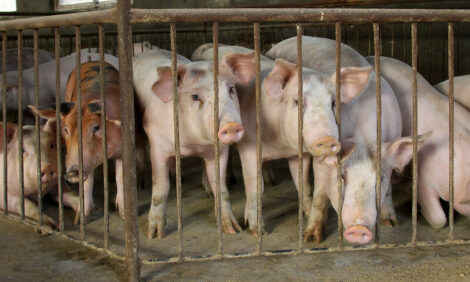



Weekly Overview: Antibiotic Free Pig Production Presenting Challenges
ANALYSIS - A research trial in Denmark is looking at the challenges of raising pigs without any antibiotics whatsoever.The number of pigs arriving at the slaughterhouse without having been treated with antibiotics is growing all the time, yet this achievement has by no means been painless for the producers.
The research trial, undertaken on pig farms in Bornholm, found that antibiotic free production is much more labour intensive and involves more demanding biosecurity tasks, especially time-wise as cleaning equipment and work gear must be more thorough.
Producer Karsten Westh, taking part in the trial, commented: "It’s an illusion to think that it doesn’t cost extra to produce pigs like this. We have to spend many more hours in the housing units, which obviously costs money.
"One thing we have noticed is that there is a much bigger difference in growth rates among the pigs in a single litter. This means that production is far less regular, which suggests there will be a lower through-put."
In other news, disease has been prominent in the news over the last week as fears grow over the African Swine Fever (ASF) situation in Eastern Europe, notably Estonia.
The Russian veterinary authority, Rosselkhoznador, said there are fears that the carcases of diseased animals are not being disposed of properly and infected material could be leeching into the water courses and contaminating lakes and rivers.
The veterinary agency said that in Estonia about 3000 pig carcases had been dumped in a burial ground on the shores of Lake Peipsi near Mustvee and not properly buried.
Estonia reported 16 new outbreaks to the OIE this week including 17 cases in wild boar and two cases in farmed pigs, which resulted in another 2332 pigs being destroyed.
OIE reports also showed new outbreaks in Russia and Lithuania. In Russia, four backyard pig farms lost a total of 46 pigs and in Lithuania, three backyard operations were affected.
Latvia reported 39 new outbreaks in wild boar, Russia seven and Poland and Lithuania just one case each.
The Russian veterinary authority, Rosselkhoznador, said: “The increasing number of new outbreaks in the summer months confirms the trend of seasonal incidence of ASF among both domestic and wild animals.
“According to numerous observations, including those from Russian scientists, the highest number of outbreaks are seen in the summer months between June-August every year.”
The veterinary authority said the problem is made worse because during the summer many pigs are traded and the spring months are traditionally the time when piglets are fattened in Eastern Europe.
The increasing ASF cases in Europe have also lowered pigmeat supply, pushing pigmeat prices upwards, according to the latest Agricultural Outlook report from the OECD and FAO.








